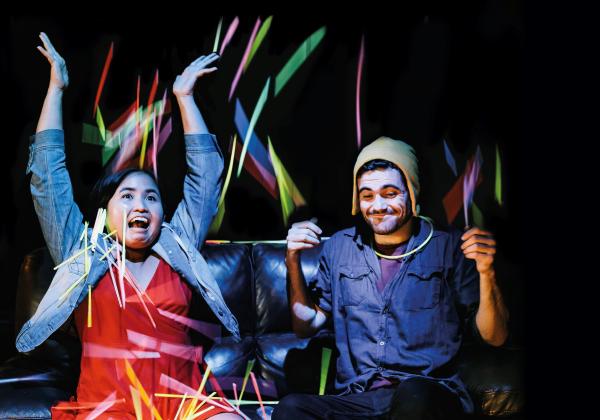Daniel's project: "Breathe"
Breathe, a stage play about experiencing psychosis, was funded by a 2018 Like Minds, Like Mine Community Grant.
We sat down with Daniel Goodwin, its creator and star, to find out how Breathe enabled New Zealand and London audiences to gain a greater understanding of psychosis.
Q: How did you come up with the idea for Breathe?
Halfway
through my theatre studies in London, I was mugged in a park and that set off a
dissociative episode. Within about a month, I had a schizophrenia diagnosis.
I felt like I faced an ultimatum: I can go down this medical route which doesn’t feel right for me, or I can incorporate figuring out what this diagnosis means for me into my theatre and poetry practices.
I went with incorporating it into my performance work, and, eventually, those poems and experiences became Breathe.
Q: How did Breathe change in the move from London to New
Zealand?
In London, Breathe was a solo show with recorded
voices interacting but still focused on myself.
When I brought to it New Zealand, I wanted to include other people and make it an ensemble. That had a really interesting effect on the shows held at the Basement Theatre and BATS down in Wellington.
Q: How does Breathe counter the prejudice that can exist around
receiving a diagnosis?
When I was first diagnosed, half of the doctors
and nurses I talked to didn’t have any information to give me, but they still looked at
me as if they knew what that name meant or implied.
Breathe was a way of saying to an audience ‘Hey, I don’t really know what this experience is. But that’s okay. This is the process that I’m going through – a really important one for how I live, interact with the world and other people, and eventually give words and form to my experiences.’
Q: How does Breathe connect people with psychosis in a way that reduces
discrimination against those experiences?
What theatre and performance
have in Breathe that the pathological side doesn’t is that we don’t always have
to box or name things. We can show it, we can exist in it and say, ‘Here. This is a
mess. But does it look familiar?’ and the audience members can say, ‘yeah. I get that. I
don’t have words for it either, but I get you.’
Q: What sort of responses did you get after the play?
People would
come up and say ‘I know that thing that you showed at the middle or at the end. I’ve
done that. I’ve gone through that.’
Occasionally someone would come up and say ‘actually, my family member has gone through this, and I’ve never seen it before. Breathe was a point of reference for me and it was really useful and helpful’.
Q: How did you first hear of the Community Grants?
The Like Minds, Like Mine
Community Grants I would say is probably the largest form of performing arts
support out there that we have?
Q: What was the best thing the Community Grants enabled you to do?
In
the arts community, we’re constantly looking for funds, scrounging, asking for people to
do things and for spaces for free.
The Community Grants took care of all these things and gave us so much space to focus on the work.
Q: What would you tell someone who is thinking of applying for a
Grant?
Use it, embrace it! It is such a blessing to have a source of
funding that is so open to how you want to define and communicate your project.

